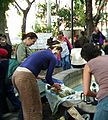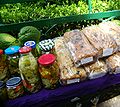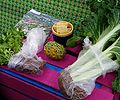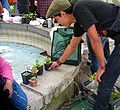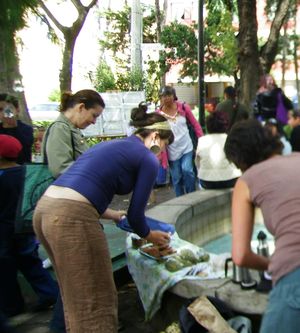
Merkaba Trueke is a group that gets together to exchange resources, knowledge, and services through barter. Rather than using money, people must exchange goods and services and this exchange is based on trust, solidarity, cooperation, reciprocity and mutual assistance rather then hierarchical market values. In this way people within the Merkaba Trueke not only value the items and services they value other people within the group. This is barter exchange is part of a group called Semillero Romita.
Meeting Time[edit | edit source]
The group meets every last Sunday of the month in Plaza Romita, Mexico City, Mexico.
How does the Barter Exchange Work[edit | edit source]
Using barter or Romitas[edit | edit source]
Each member brings their products and a list of knowledge and services that they offer or they can bring Romitas. Romitas are like a ticket that can be used at the exchange if you do not have something to trade. Each person sets Romita cost of their products. No cash is allowed. Romitas are much different from Money.
Difference between Romitas and Money[edit | edit source]
| Money | Romitas |
| we have no control over the creation or distribution | we can issue them and thus create an economy based on local needs |
| can be accumulated indefinitely | discourage accumulation in favor of circulation between producers |
| its value is based on shortage and promotes scarcity | are abundant |
| generates interest | are free of interest |
| originates from debt | originates from giving and from ones rights |
Who can Participate[edit | edit source]
- New members are asked to attend a short introduction the morning of the market so that they can learn about the process, "rules", and meet other members before trading.
- People do not have to have fresh garden veggies or fruits in order to trade. Other items and services for trading include: cooking, knitting, bookbinding, crafts, lessons in some skill, or anything else you can think of that would be attractive to other members.
- The market tries to promote the value of handmade items, thus if someone want to sell second hand items they can, however it is generally not valued at the equivalent cost of those handmade items.
How do you know the supply and demand of other members?[edit | edit source]
The group has a directory of supply and demand with data from it's members. When joining the group you receive a directory and it is updated each time a new member joins.
Advise for New members[edit | edit source]
A good Producer and Exchange member[edit | edit source]
- seeks not only to meet their needs, but also seeks to provide products, knowledge and services that are in demand in the group and meet the needs of other exchange members
- analyzes the quality of care offered
- delivers what it offers
- ensures that its products and services address ethical, ecological and sustainability ethics rather than serve commercial or market value dictations.
- not want to cheat or take advantage of other exchange members, but to establish relationships of long lasting mutual benefit.
Contact[edit | edit source]
http://semilleroromita.blogspot.com/
semillero.romita@gmail.com
5556 8833
04455 3670 1754
References[edit | edit source]
